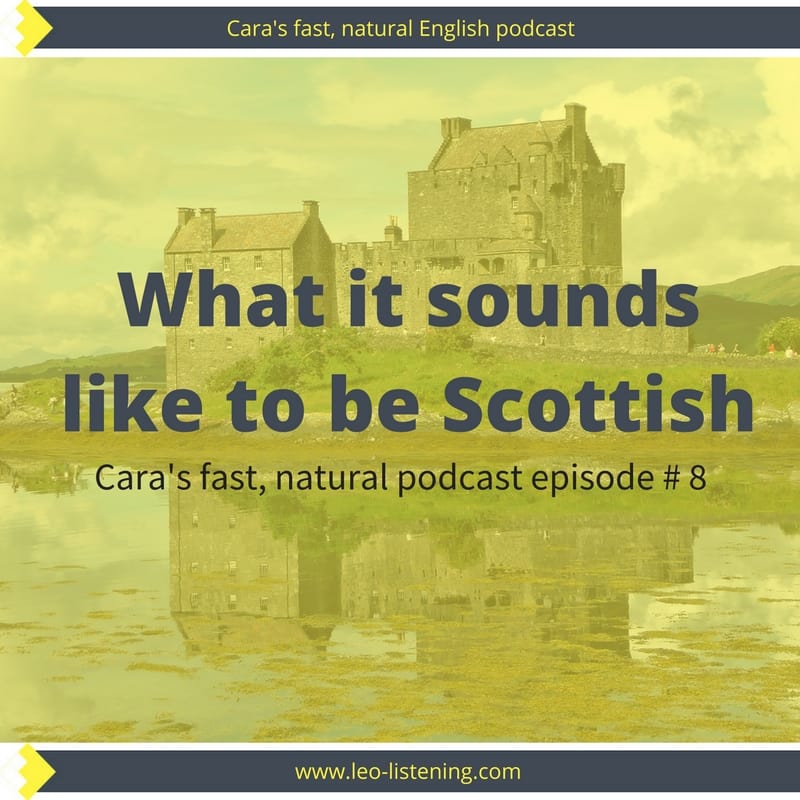Podcast #8: What It Sounds Like To Be Scottish

The Scottish accent. The one that you find pretty much incomprehensible. I’m here to tell you that it’s not that bad. There are in fact many variants of the Scottish accent across Scotland.
In this podcast episode, I introduce you to four typical Scottish accent features to help you understand Scottish speakers better. Bonus – some of these features exist in other accents of the UK and are also typical of spontaneous conversational English. So, by listening you’ll discover not only Scottish accents, but some tricky features of conversational English that you have difficulty with. Listen and enjoy.
Useful Vocabulary
- Stirling : medium sized Scottish town in Central Scotland
- Glasgow : Scotland’s largest city
- Edinburgh : Scotland’s capital city
- In the podcast I use the term “Central Scotland” to refer to the “middle” part of Scotland, stretching from Glasgow to Edinburgh with Stirling in between. This area is also referred to as “the Central Belt”.
- Glottal Stop : a sound made by closing the vocal folds in your throat. It’s phonetic symbol looks like this /ʔ/
- rural : to do with the countryside, not urban
Scottish Accent Features
Glottal Stop
A sound made by closing the vocal folds in your throat. It’s phonetic symbol looks like this /ʔ/. We use this sound instead of /t/ in the middle and at the end of words. Glottal stops are frequent in spontaneous, conversational English and in some other British accents, such as Cockney, a London accent.
Vowels
I made an error with my explanation! Apologies! The vowel sound I use in ‘good’ and ‘book’ is this one /ʊ/. The two sounds are identical. When I speak with a more Scottish accent, for example if I’ve spoken to my parents recently, I replace /ʊ/ with a more rounded [ʉ] sound.
R-Sound
In Scottish English, like in American English and some other British varieties (accents in the South West of England for instance), Scottish speakers pronounce ‘r’s at the of words, as well as at the beginning and in the middle. The ‘r’ sound is different to the standard British English sound, because to pronounce it, you touch the roof of you mouth briefly. It’s phonetic symbol looks like this /ɾ/.
/th/ => /f/
I’ve mainly noticed this in Glasweigan (=from or concerning Glasgow) accents. The /th/ sounds at the beginning or at the end of words becomes /f/.This can also happen in other accents of British English when people are speaking casually and spontaneously.
To listen to some of these sounds, you can click their symbols on this interactive chart.
More On Scottish Accents And Dialects
No dictations this time, but instead some more resources for listening to and learning about Scottish accents and dialects.
- Listen to a whole variety of Scottish accents at the IDEA accent archive.
- Also on IDEA, on the test your comprehension page, try transcribing extract 20 of a Scottish speaker.
- If you want something less academic, and especially if you want to learn some rude words, take a look at Wee Scottish Lass’s videos.
- Feeling ambitious? Or just want to learn some new Scots words? Try this quiz.
- Translate standard English words into Scots with this dictionary.
- If you find any more links or resources, please let me know! And if you’re enjoying the podcast, please follow me on Soundcloud. You can also leave your comments questions and feedback on there, or below this post. Thanks.
Photo used in blog post image available at: https://pixabay.com/en/eilean-donan-castle-castle-650681/
Hi! I’d like to practice my listening on Scotland accent. Where can I find more audios, videos?
Hey Cesar. Thanks for your comment. I recommend, if you haven’t already, my post about the IDEA accent archive. Also, you can listen to my podcast on YouTube or any of my videos as I have a Scottish accent!